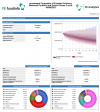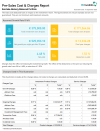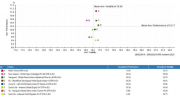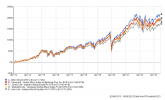So for a pension of €450k assuming 25% lump sum is taken you would have about 375,000 left in the ARF.
Charges are actually less important than asset allocation - getting the right investment approach. That's what you are really paying an adviser for - not to be a facilitator.
For example a bank account in an ARF essentially has "no charges" but won't cut the mustard when it comes to imputed distributions of 4% and paying fees to boot.
I've used a middle of the road balanced approach but ideally you would want more in equities than this. If you can't take the investment risk you should really give consideration to an annuity for at least part of it.
So, you need to test your investment approach using some stochastic modelling like this

Then you need to compare costs on a full disclosure basis like this

Marc Westlake CFP, TEP, APFS, QFA, EFP
Chartered, Certified and European Financial Planner
Registered Trust & Estate Practitioner
Everlake
Charges are actually less important than asset allocation - getting the right investment approach. That's what you are really paying an adviser for - not to be a facilitator.
For example a bank account in an ARF essentially has "no charges" but won't cut the mustard when it comes to imputed distributions of 4% and paying fees to boot.
I've used a middle of the road balanced approach but ideally you would want more in equities than this. If you can't take the investment risk you should really give consideration to an annuity for at least part of it.
So, you need to test your investment approach using some stochastic modelling like this

Then you need to compare costs on a full disclosure basis like this

Marc Westlake CFP, TEP, APFS, QFA, EFP
Chartered, Certified and European Financial Planner
Registered Trust & Estate Practitioner
Everlake
Last edited:


